 Today’s capitalism offers efficiency within silos, but devastating externalities. “POEMs” (Public Official E-Markets) across the economic base would make localized, circular, activity more profitable.
Today’s capitalism offers efficiency within silos, but devastating externalities. “POEMs” (Public Official E-Markets) across the economic base would make localized, circular, activity more profitable.
1) TRANSPORT: Silo-busting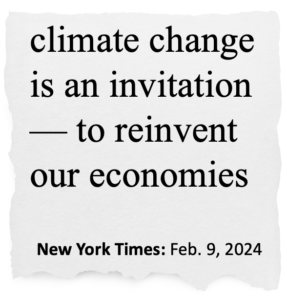
How often do we see vans from DHL, FedEx, and Amazon jostling along a street? Each of these corporates has its own scheduling platform. Supermarkets likewise each have their own platforms, drivers, vehicles, and pick-up points. So do each of the food delivery apps. Traditional local deliverers can’t compete with the order-taking clout of these platforms, they have to get onto one of them – becoming a DHL franchisee for example.
The climate absorbs wider inefficiencies of this model. Vehicles are running duplicate routes, returning to an array of depots to refill. The same is true of cars. How often do a Lyft and Uber driver pass each other en-route to pick up passengers to which the other was originally closer? That factor is part of the 69% increase in pollution caused by current ride-hailing apps.
 POEMs is a comprehensive open platform. Anyone can sell delivery services – or seats for a journey – on their own terms. The system can fluidly assemble a personalized chain of loadspace slots – or seats across different modes of transport – using local links at every stage. It uses each seller’s multi-sector, insurable, reliability record rather than a narrow business model to ensure completion.
POEMs is a comprehensive open platform. Anyone can sell delivery services – or seats for a journey – on their own terms. The system can fluidly assemble a personalized chain of loadspace slots – or seats across different modes of transport – using local links at every stage. It uses each seller’s multi-sector, insurable, reliability record rather than a narrow business model to ensure completion.
So, if there are 10 packages, 5 lots of groceries and three pizzas to be delivered in Park Avenue this evening, it will make sense for someone wanting to price themselves into “last mile” work in that street, to set a formula in POEMs that has them getting cheaper the more drop-offs from local hubs they can aggregate. Descending rates reflect their reduced travel time and costs.
For bulk carriers further up POEMs’ supply chains, any empty loadspace in their truck can be sold in real-time. And depots or local hubs need not be fixed monolithic premises. Anyone with suitable premises can check zoning permissions, and projected earning, in POEMs then offer their building as a drop-off and pick-up hub; for a few hours, days, or months.
2) PRICING: Environmental costs surfaced
In today’s fragmented platforms connecting buyers and sellers, an operator’s charge of around 30% is becoming typical. This huge component of the price blunts any uplift caused by transport costs. Tiny charges, and detailed pricing tools, in POEMs (Public Official E-Markets) make travel costs a bigger part of any price. Book a chef, childminder, cleaning crew, book-keeper, or office receptionist and the most local people will likely be the lowest cost. POEMs’ markets are uniquely deep, informed, and low-overhead, so each person’s travel time and costs can be accurately and easily compensated within their individual pricing formula.
 And resources can be effortlessly expanded or shrunk to align more perfectly with need. Imagine an entrepreneurial coach driver trialling a new route in POEMs this Saturday. She might have used POEMs’ vehicle rental markets to purchase only an option on a luxury bus for the day, not committed to a rental.
And resources can be effortlessly expanded or shrunk to align more perfectly with need. Imagine an entrepreneurial coach driver trialling a new route in POEMs this Saturday. She might have used POEMs’ vehicle rental markets to purchase only an option on a luxury bus for the day, not committed to a rental.
Perhaps by Friday evening, only 12 seats have been booked? She can relinquish her hold on the 52-seater. Assuming her contract with passengers reserved the right to substitute a smaller vehicle, POEMs might automatically now rent her a cheaper minibus from its open markets. Meanwhile, on a more popular route, POEMs might be offering drivers a chance to profitably merge four minibus departures into one coach hire.
3) ASSET USE: Incentivizing the 4 R’s
Operators of POEMs make their money on small transactions. So they are strongly incentivized to drive the four R’s of a green economy: rental, repair, resale, and recycling.
 Take a high-end set of electric clippers owned by a householder. Currently they might sit unused for 99% of their life, while neighbors also have their own haircut appliances idle. But POEMs shows each owner what their grooming aid could earn if rented when not needed. It can instantly arrange micro-insurance and for a neighbourhood “holder” to handle storage, disinfection, plus checking out and back, for an automatically administered split of earnings. The clippers could be collected and taken to the holder, with the owner having pre-emptive rights to get them returned as needed.
Take a high-end set of electric clippers owned by a householder. Currently they might sit unused for 99% of their life, while neighbors also have their own haircut appliances idle. But POEMs shows each owner what their grooming aid could earn if rented when not needed. It can instantly arrange micro-insurance and for a neighbourhood “holder” to handle storage, disinfection, plus checking out and back, for an automatically administered split of earnings. The clippers could be collected and taken to the holder, with the owner having pre-emptive rights to get them returned as needed.
After a year of intense cutting, the clippers might need maintenance. Availability of local repairers gets them back in circulation quickly. When it’s time to let them go, there’s an informed, deep, safe, market for preowned products. Finally, when they can cut no more, buyers await in POEMs’ markets for “breakers” and any components with monetary value.
For home grooming devices read; kitchen gadgets, entertainment consoles, toys, garden furniture, home medical equipment, agricultural machinery, car accessories, and so on. In each case: Less manufacturing and packaging, more value for the asset owner and periodic user.
This would equally apply to static resources. A home washing machine can be turned into a cash source by anyone willing to do neighbors’ laundry. This wouldn’t be the overhead-laden, niche, market on which Washio, for example, splashed $16m trying to aggregate before the app folded. Laundry would be just one sector among thousands in POEMs. The vibrant market that should follow might reduce the attraction of owning washing machines.
4) INDUSTRY: Small is bountiful
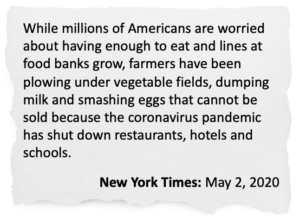 Closed platforms powering large organizations also dominate food supply. In Canada, 95% of beef goes through just three meatpacking plants. Giants like Tyson, JBS, and Cargill process millions of birds, hogs, and cows a week in the US with producers tied to financials that force huge scale. That creates effluent lakes, long-haul transport, and supply chains that can’t adapt.
Closed platforms powering large organizations also dominate food supply. In Canada, 95% of beef goes through just three meatpacking plants. Giants like Tyson, JBS, and Cargill process millions of birds, hogs, and cows a week in the US with producers tied to financials that force huge scale. That creates effluent lakes, long-haul transport, and supply chains that can’t adapt.
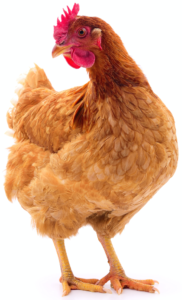 POEMs re-balances towards localized suppliers. In food production for example, anyone with some scrubland wanting to raise chickens could go to POEMs’ deep markets for live pullets, feed, deliveries, housing, building erection, labor, and, in time, sale of eggs or local meat. Is their area zoned for community farming? POEMs’ links to official databases allows it to advise.
POEMs re-balances towards localized suppliers. In food production for example, anyone with some scrubland wanting to raise chickens could go to POEMs’ deep markets for live pullets, feed, deliveries, housing, building erection, labor, and, in time, sale of eggs or local meat. Is their area zoned for community farming? POEMs’ links to official databases allows it to advise.
While unlikely to interest Colonel Sanders’ gargantuan procurement operation, the local chickens will appear as immediate options for home cooks, caterers and restaurants exploiting POEMs. With food purchasing by government (schools, prisons, canteens in official buildings, health facilities) committed to POEMs,there is core demand to kickstart buying.
Food miles are reduced in this model. Increased adaptability and responsiveness maximizes asset usage. If poultry don’t thrive on the scrub, or prices fall, checking to-the-minute local trends and prices in processing, or sale, of goat milk/wool/meat would take seconds.
Comparable impacts could emerge across non-specialist manufacturing, printing and other sectors where exposed travel costs and sluggish responsiveness become a financial liability. In construction, a huge polluter, demand should fall as owners of existing buildings use POEMs’ tools to atomize and monetize existing assets.
5) POLITICS: The heat is on
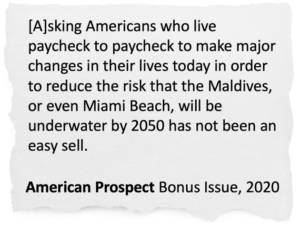 POEMs’ most significant contribution to climate policy might simply be alleviation of pocketbook anxiety. By fostering opportunity, safety nets, and interventions it would allow people battered by today’s capitalism space to focus on the world around them. To boost that, the new markets could include a specific Green Dashboard, tallying mileages, re-use of products, and other eco-metrics for any sector, geography, or user.
POEMs’ most significant contribution to climate policy might simply be alleviation of pocketbook anxiety. By fostering opportunity, safety nets, and interventions it would allow people battered by today’s capitalism space to focus on the world around them. To boost that, the new markets could include a specific Green Dashboard, tallying mileages, re-use of products, and other eco-metrics for any sector, geography, or user.
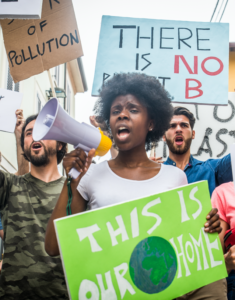 Politicians could then win kudos with trackable, interventions enabled by POEMs’. For example:
Politicians could then win kudos with trackable, interventions enabled by POEMs’. For example:
- Green incentives: Tax breaks for tree planting, weatherization, re-wilding, “tiny parks” or environmental clean-ups input into POEMs? Expect to see the materials, artisans, and trainers required mobilizing within minutes as Opportunity Feeds for thousands of diverse sellers highlight anticipated demand. The breaks might be limited to one geography. The program can then be widened by changing inputs. There’s no leafleting, enrollment, verification, monitoring, or paperwork required; POEMs absorbs those functions.
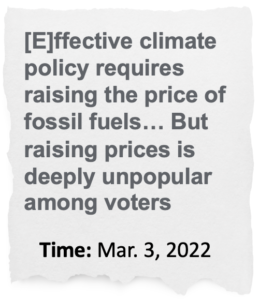 Big boys blunted: With sprawling eco-systems of small suppliers, industrialists should lose clout with policymakers. Voters involved in alternative models of production, and empowered by efficient markets, curb corporate excesses.
Big boys blunted: With sprawling eco-systems of small suppliers, industrialists should lose clout with policymakers. Voters involved in alternative models of production, and empowered by efficient markets, curb corporate excesses.- Empowered buyers:Boycotting could become effortless and razor-sharp in POEMs. For example: “I will only buy a product from the Amazon supply chain if it is 25% cheaper until they reform their packaging policy”. It would be up to legislators whether to mandate these tools as part of the system’s scope.
POEMs should be funded by corporates who run the markets in return for a fixed percentage cut of each purchase price. That model could also work in polluting older economies, allowing them to leapfrog the inefficient closed platforms that are doing so much damage in more developed nations. We have covered transition economies in a separate briefing.
